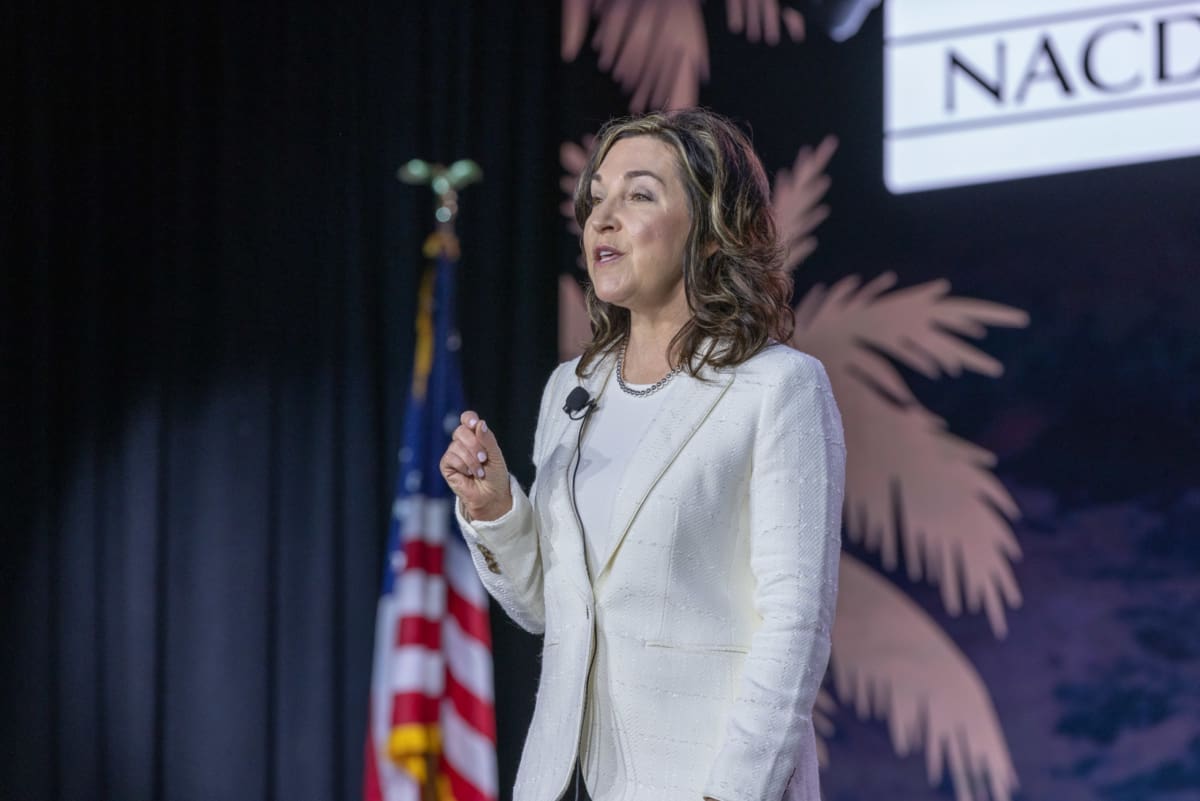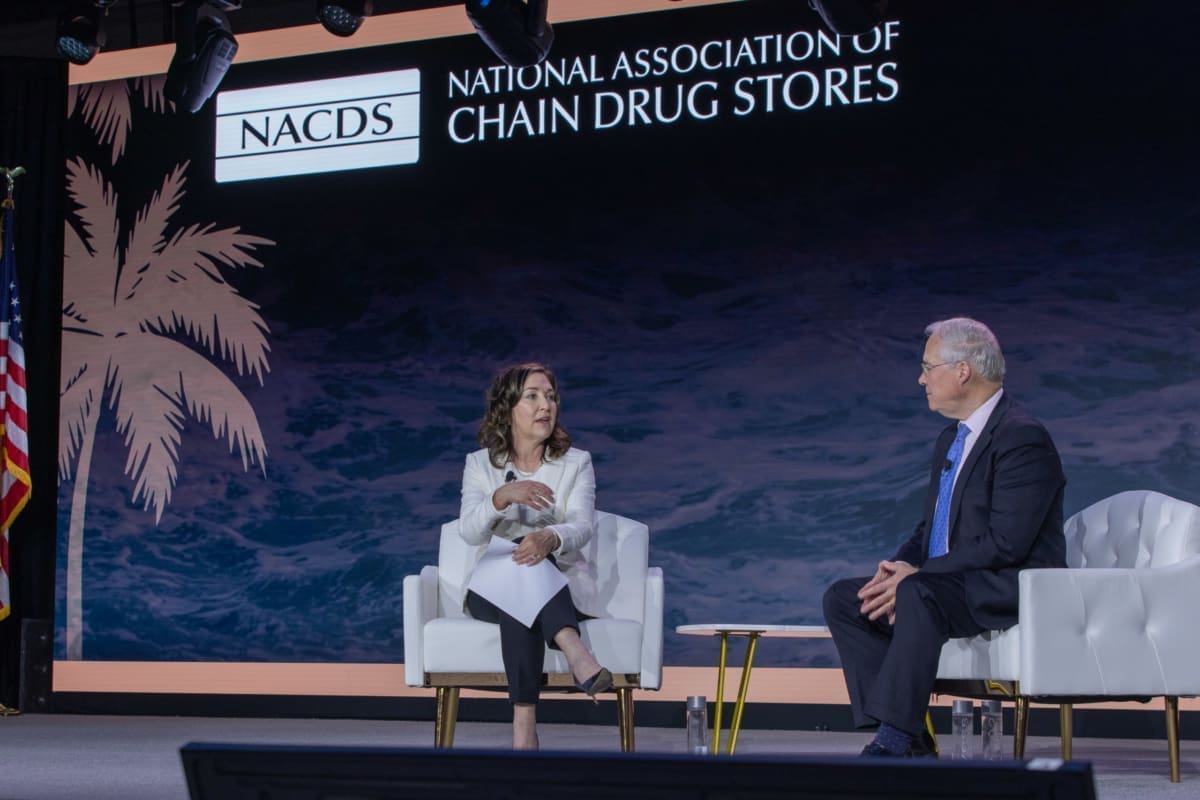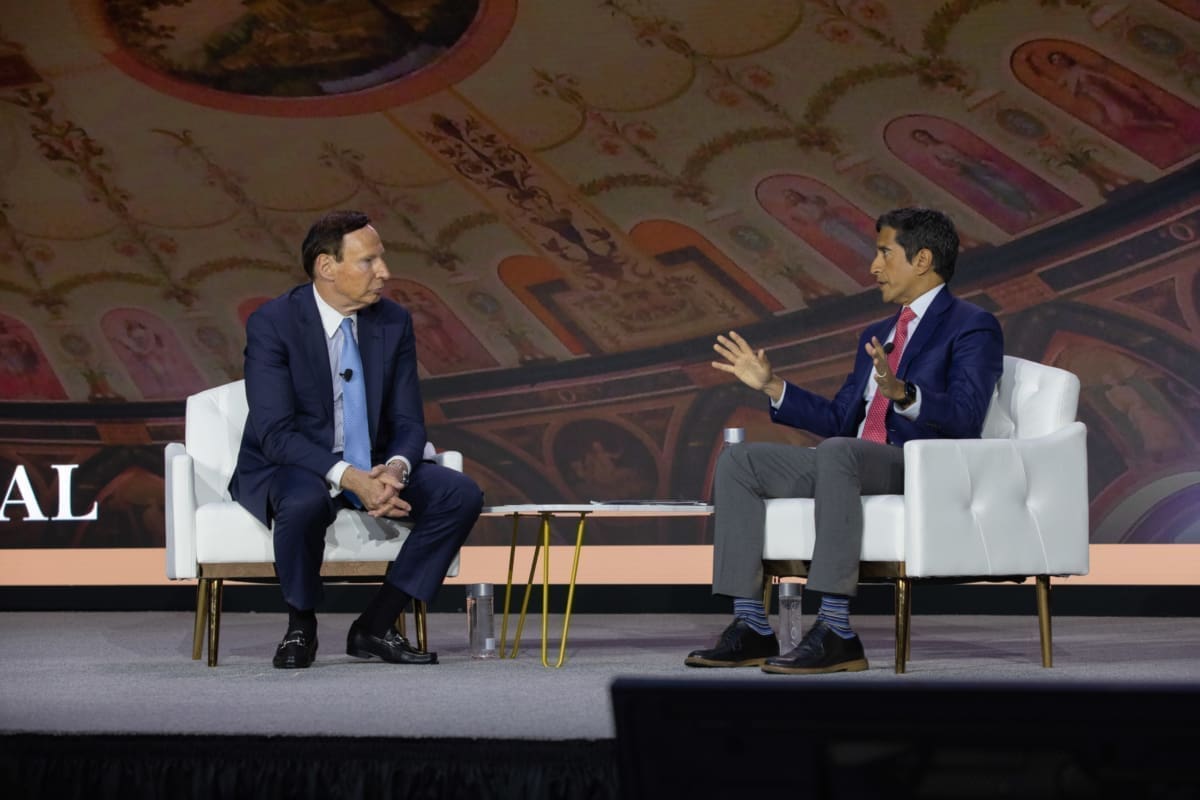Image One: Colleen Lindholz, NACDS chair of the Board and president, Kroger Health, The Kroger Co.; Image Two: Lindholz and Rodney McMullen, chairman and CEO of The Kroger Co.; Image Three: NACDS President and CEO Steven C. Anderson and Dr. Sanjay Gupta, chief medical correspondent for CNN
At the National Association of Chain Drug Stores (NACDS) Annual Meeting today, leaders commended NACDS-member retailers and suppliers for their ongoing collaboration and commitment to serving the American people — and emphasized the vital role the united industry can play in driving the future of total health and wellness.
Colleen Lindholz, NACDS chair and president, Kroger Health, The Kroger Co., and NACDS President & CEO Steven C. Anderson delivered remarks at the morning Business Program, where they welcomed members back to the one-of-a-kind NACDS event:
Lindholz declared, “It is great to see this industry — suppliers and retailers — together again, in-person. I have waited for this for quite some time.”
Anderson remarked, “NACDS is the place for top leaders to advance this industry together, and to empower the health and wellness of Americans. And that is best done — in-person — at the NACDS Annual Meeting.”
Both leaders noted that, throughout the COVID-19 pandemic, the industry has bolstered its case as “the face of neighborhood healthcare” — and thus, pharmacy’s story has only strengthened.
In describing the profound and collaborative work of NACDS retailer and supplier members in serving the American public, Anderson said, “Amid the uncertainty of the pandemic, pharmacies and pharmacy teams helped to anchor the nation’s response. We all knew about the capabilities of pharmacies and retail health and wellness. We all knew about the power of this supplier community. Together, you are the face of neighborhood healthcare.”
Lindholz focused especially on pharmacies’ access and equity — which has helped place them at the center of the ongoing COVID-19 pandemic response:
“We knew pharmacies would be the sustainable vaccination solution. Pharmacies went on to give two of every three COVID-19 vaccine doses. Pharmacy teams arrived in areas where we were most needed. Half of pharmacy COVID-19 vaccination sites are in areas of high social vulnerability, and 70% of pharmacy testing sites are in areas of moderate to severe vulnerability.”
She continued, saying, “We are poised to improve population health by empowering individual health through our commitment to collaboration, accessibility and equity. There is power when we move in a unified direction at a pace that matters for a cause much greater than ourselves.”
During their remarks, Lindholz and Anderson also detailed pharmacies’ successes on behalf of the American people — united through NACDS — and the continued work that must be done to help ensure the continuity of accessible pharmacy-based care beyond the COVID-19 pandemic.
“I am so excited about how NACDS – and our allies in pharmacy and health care – were able to ramp up when it mattered most,” Lindholz said. “I want to say thank you to all. We can do much more together than we can do separately.”
Specifically, Lindholz described members’ ongoing work to confront direct and indirect remuneration (DIR) fees — which jeopardize patients and pharmacies alike; the enactment in 2021 of more than 70 state bills that have helped to expand patients’ access to pharmacist-provided care services; and the introduction in March 2022 of bipartisan legislation (the Equitable Community Access to Pharmacist Services Act) that will help maintain patients’ access to care at local pharmacies.
Similarly, Anderson noted the industry’s work at the federal level to make the case for pharmacy teams — which spurred and shaped 10 amendments to the current declaration of the Public Readiness and Emergency Preparedness Act – the PREP Act:
“Together, we advocated on COVID-19 vaccinations and beyond.”
Anderson also went on to illustrate the power of association in society, democracy and advocacy — and what that means for the future of healthcare delivery:
“NACDS serves as the collective and collaborative will of our membership.
“As we look to the future, we are focused on taking the positive statements about pharmacy, taking the lessons learned, taking our recommendations, taking the results achieved for the American people and turning them once and truly for all into a vastly improved healthcare delivery system … that sees pharmacies like hundreds of millions of Americans see them: as the face of neighborhood healthcare.”
Lindholz emphasized all the industry can do in the future for total health and wellness – in the pharmacy setting, but also beyond:
“The future of health care is value-based, not volume-based … The future of health care is personalized, not generalized … The future of health care is inter-professional, not siloed. And, the future of pharmacy is patient-driven, not prescription-driven.
“I imagine a world where pharmacists are universally recognized as accessible providers and the patient care they provide is fairly compensated. These are policies we can and will advance to make this world a reality.”
Anderson concluded his remarks, saying, “Just look at what you have done for the American people. Now it’s time to keep pressing ahead to see what more we can do – together.”
Rodney McMullen, chairman and CEO of The Kroger Co. also joined Lindholz in a panel discussion during today’s Business Program to talk about the future of the industry – including the intersection of retail and value-based, patient-driven health care.
Additionally, the Program included remarks by Dr. Sanjay Gupta, chief medical correspondent for CNN.
Lisa Paley, head, U.S. and North America, GSK Consumer Healthcare, also spoke, and GSK Consumer Healthcare supported this morning’s Business Program. Similarly, Dan Figus, vice president, U.S. chief customer officer, Johnson & Johnson Consumer Health, will speak at Tuesday’s Business Program which is supported by Johnson & Johnson Consumer Health.


